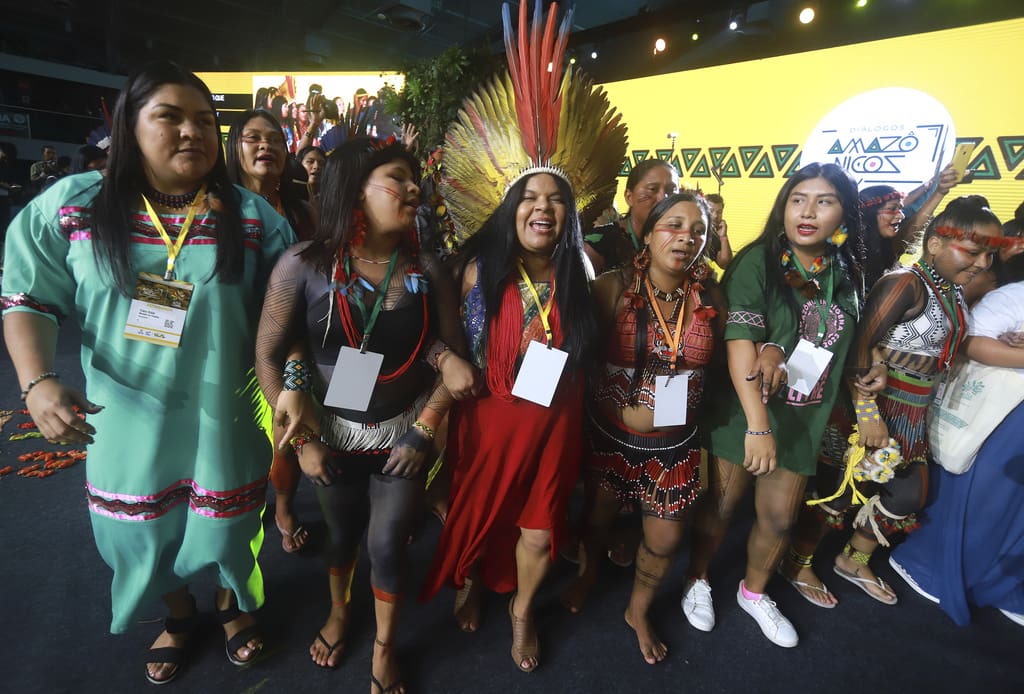By DAVID BILLER and FABIANO MAISONNAVE Associated Press
.BELEM, Brazil (AP) — The diminutive woman with a white feather headdress stood on the stage of the majestic colonial theater in Brazil’s Amazon on Monday and addressed the crowd.
The woman, Minister of Indigenous People Sonia Guajajara, declared the day “the milestone of Indigenous participation,” then cited the national statistics institute’s freshly released census data that revealed the full scope of the nation’s Indigenous population: 1,693,535 people.
While just 0.8% of Brazil’s population, the figure marks an 89% jump from the nation’s prior census, in 2010, due to greater willingness of people to recognize their roots and better survey methods, including access to previously unreachable villages, she said. The latter largely explains why their numbers within Indigenous territories grew 20%, to 622,066.
“This a historic moment with that picture that the statistics agency has made,” she said on the eve of the two-day Amazon Summit in Belem. “It’s a historic moment of the restart of social, popular participation, and of the dialogue of our civil society with government.”
Support our partnership with the nonprofit AP. Give today
In some 400 events, representatives of Indigenous groups, riverine communities, fishermen and Afro-descendants discussed topics such as harassment from carbon credit companies, ending deforestation and illegal mining. One of their main demands was to cancel new oil projects in the region.
Though the large majority came from Brazil, which holds two-thirds of the Amazon, there were also representatives from all eight countries. Most events took place in the same convention center where the presidents will meet starting on Tuesday.
There, Indigenous Warao people from Venezuela sold crafts made of straw next to Kayapo Indigenous people painting their bodies with traditional designs. Riverine community stalls sold native honey, Brazil nuts and cassava flour. There were also protests against oil exploration near the mouth of the Amazon River.
“You can clearly see that Brazil has a significant social problem to solve, a social problem left by the previous government,” said Colombian Indigenous leader Anitalia Pijachi Kuyuedo, referring to the administration of far-right former president Jair Bolsonaro. “There are many grievances, much pain, much anger, and you can feel the emotions in the words of those you speak with.”
In an interview with The Associated Press on Monday, Guajajara, the minister, agreed that their anxiety has been palpable, but finally they have a forum.
“There were six years of the complete silencing of civil society, and spaces for social participation were extinguished. People became very afraid to express themselves,” Guajajara said. “This is the first moment when society is once again engaging in dialogue with the federal government.”
Brazil’s government had expected 10,000 attendees, but instead, 24,000 had arrived, according to Guajajara.
Over 1,200 of them were camping in a private recreational park on Belem’s outskirts, with tents
The interim president of Brazil’s statistics institute Cimar Azeredo announced the revised population statistic to the crowd, saying it had “helped to rediscover Brazil.”
Their larger numbers means a greater share of the government resources can be earmarked for investment in Indigenous people’s health and education, Planning and Budget Minister Simone Tebet said at the event.
And Guajajara stressed that it also means more money for security – a need she said was underscored just hours earlier, when three people of the Tembe ethnicity were shot.
And in coming months, she told the crowd, the federal government will expel invaders from 32 Indigenous territories; her announcement was met by cheers and applause from the audience, plus the shaking of maracas.
“Never again a Brazil without us!”


